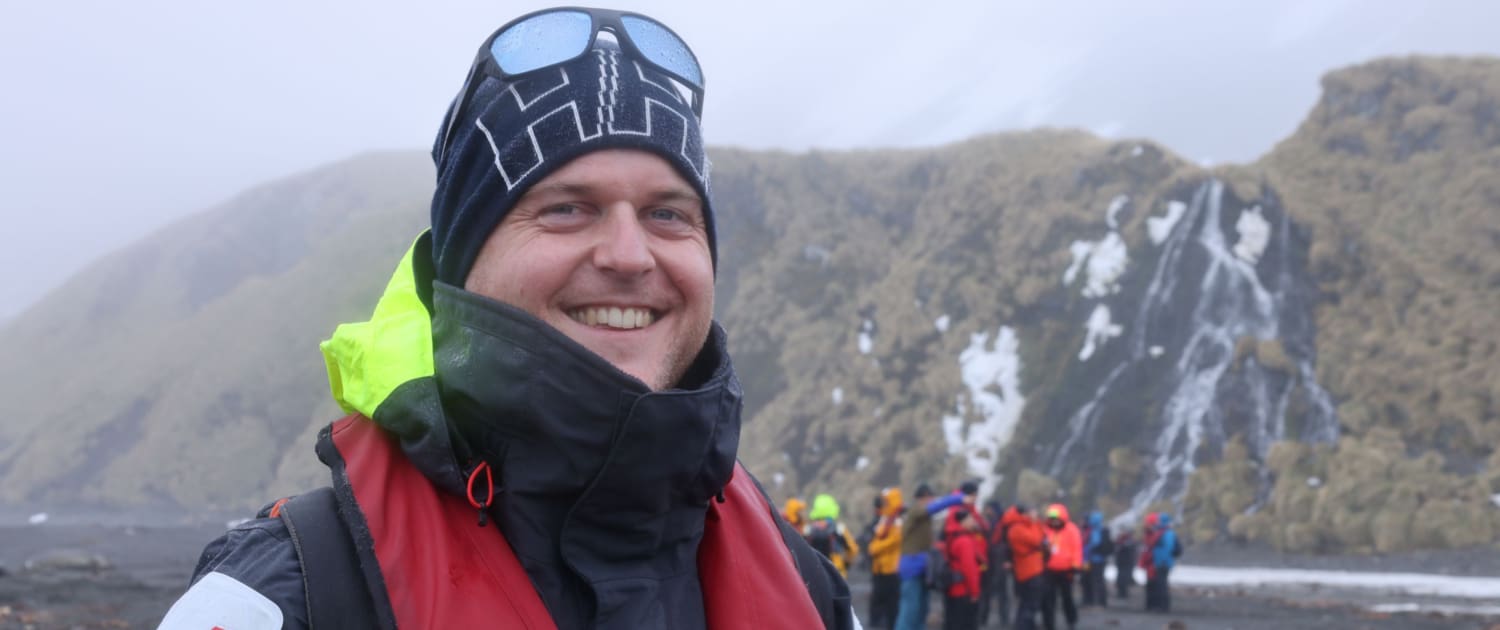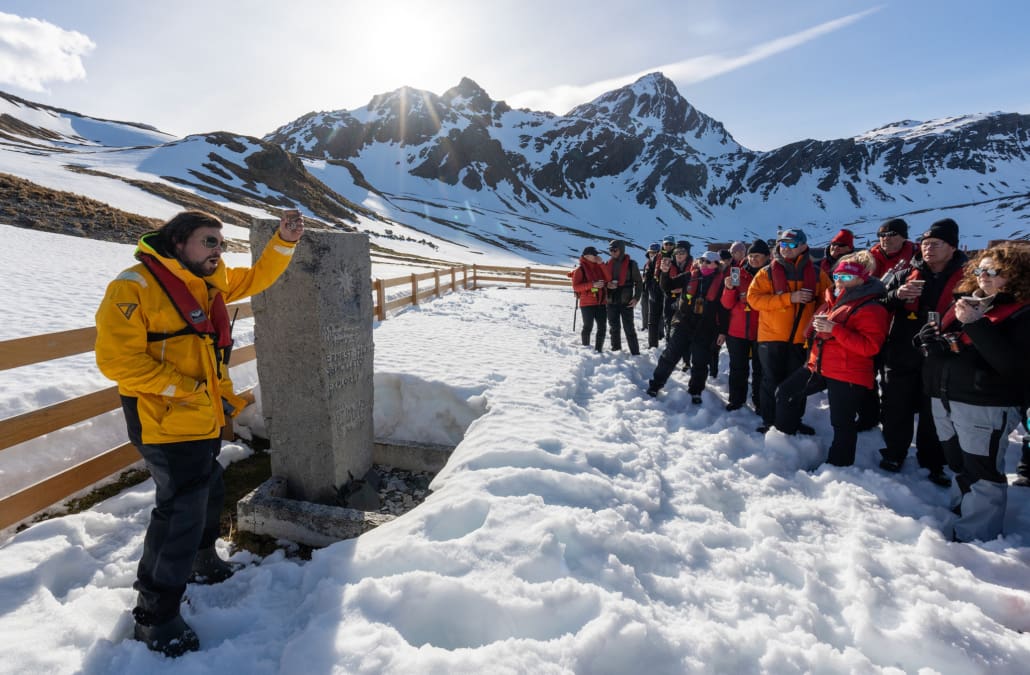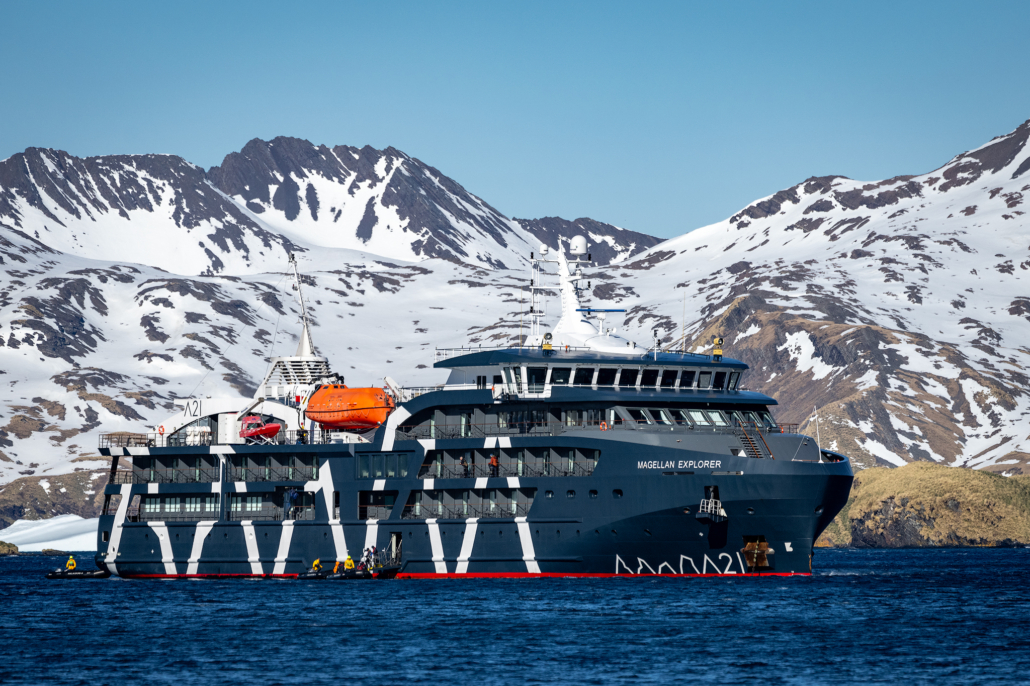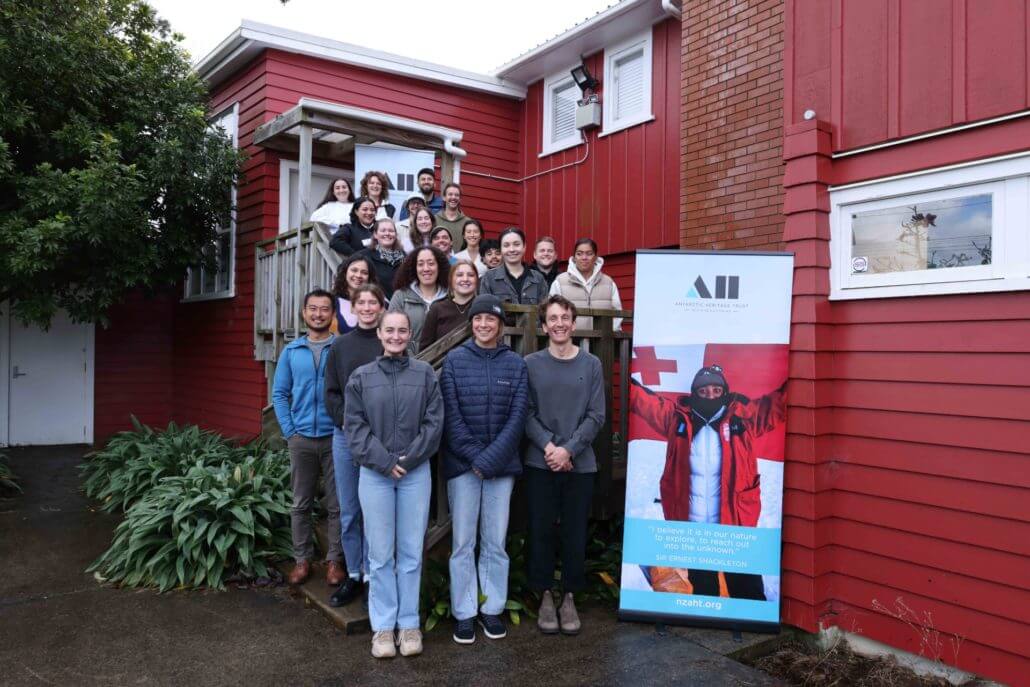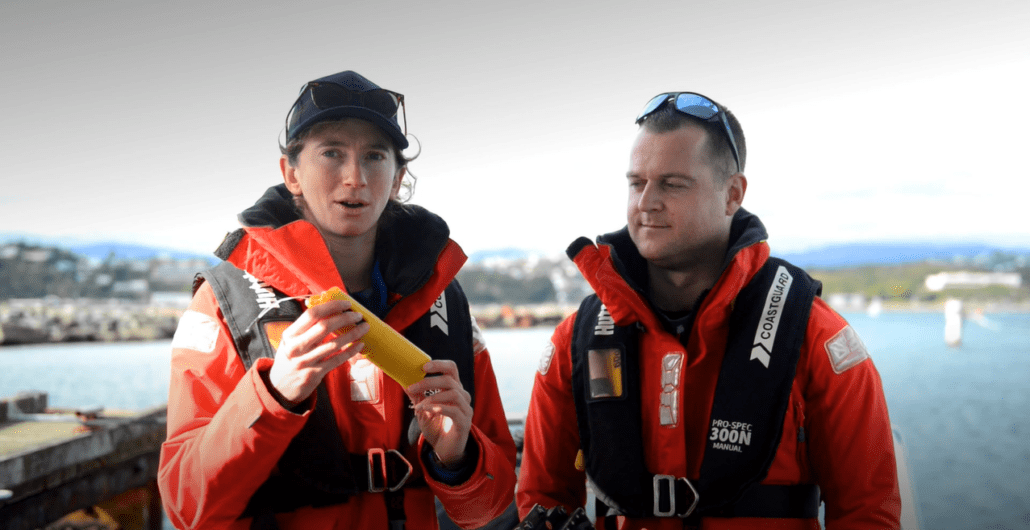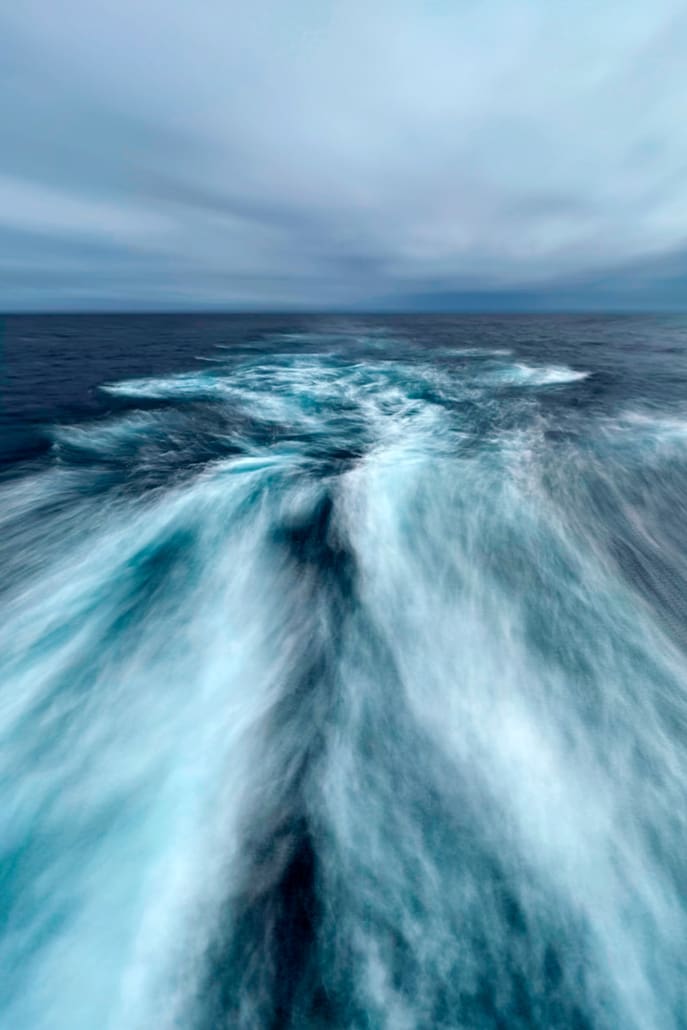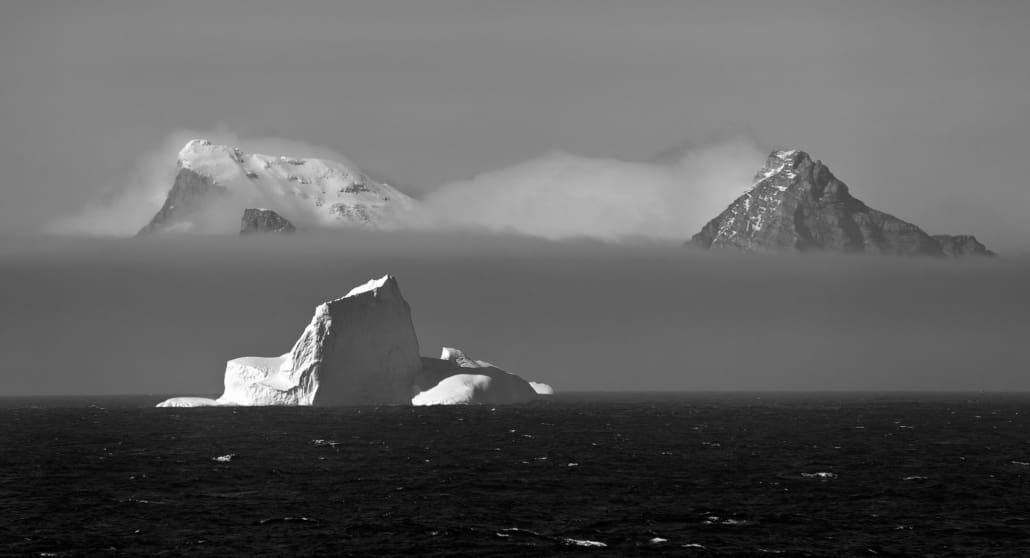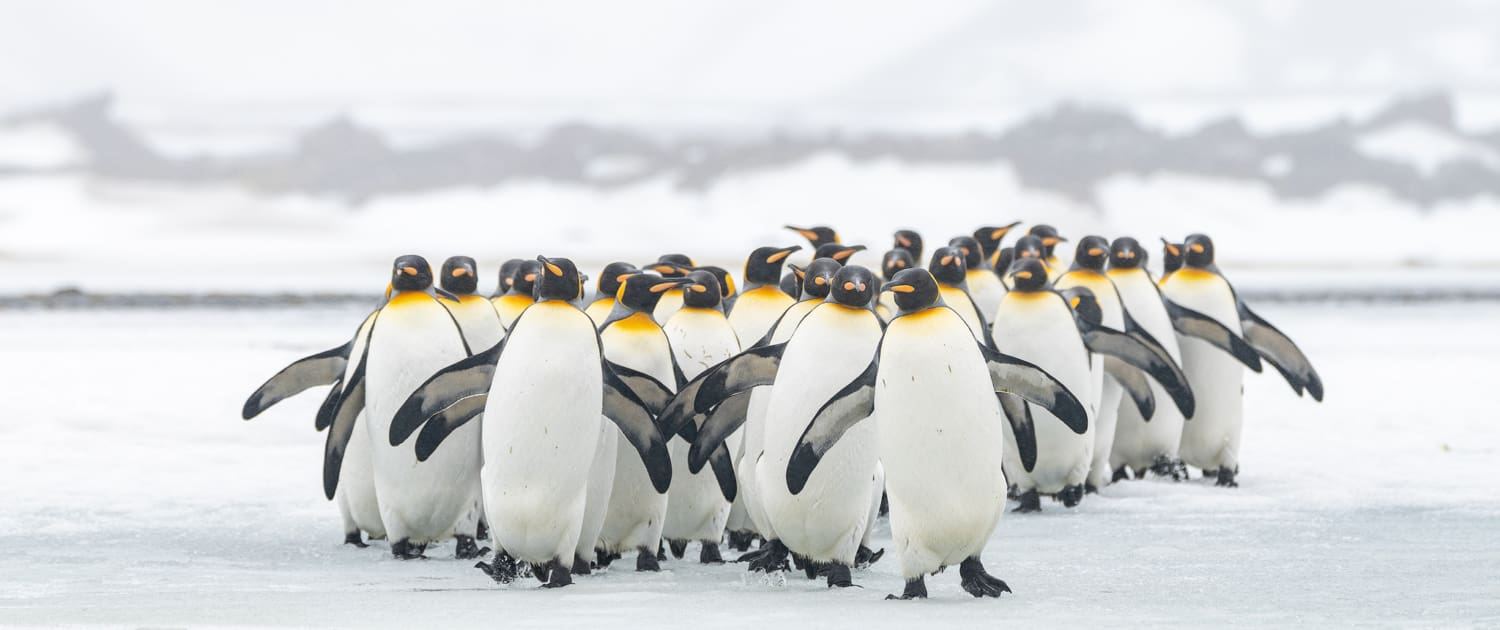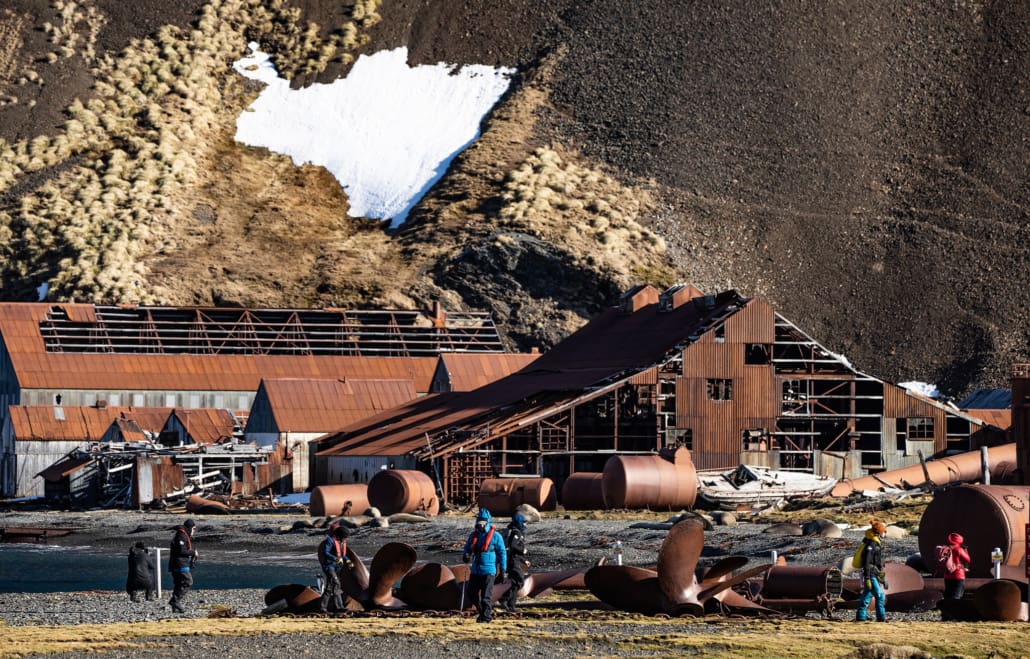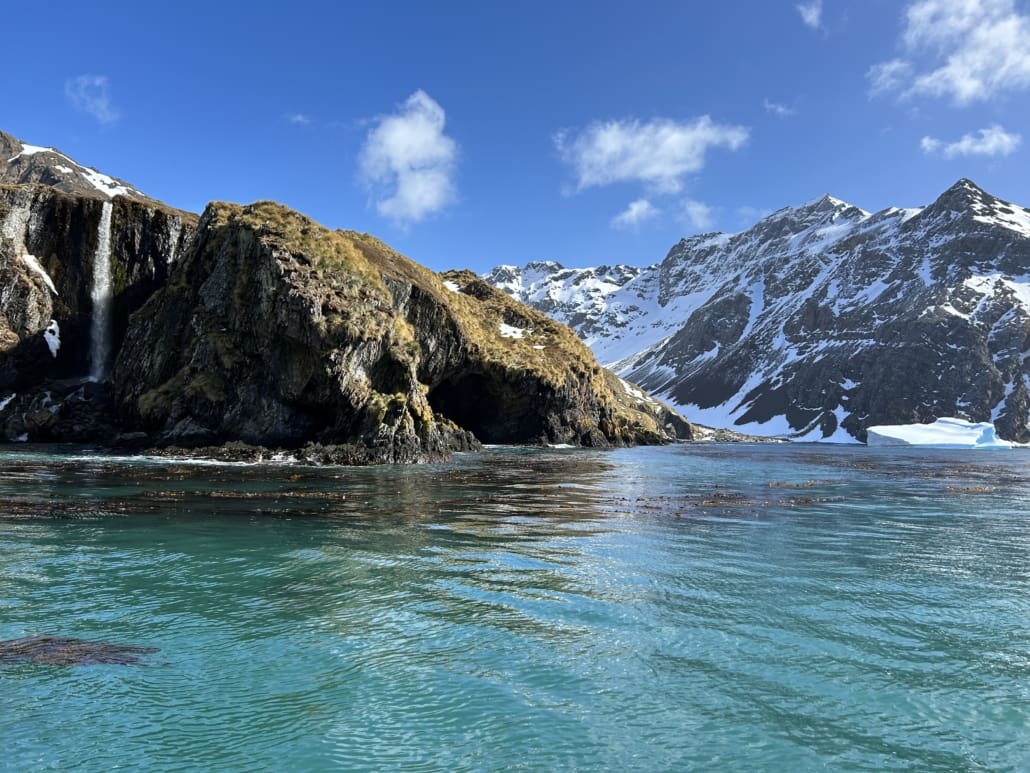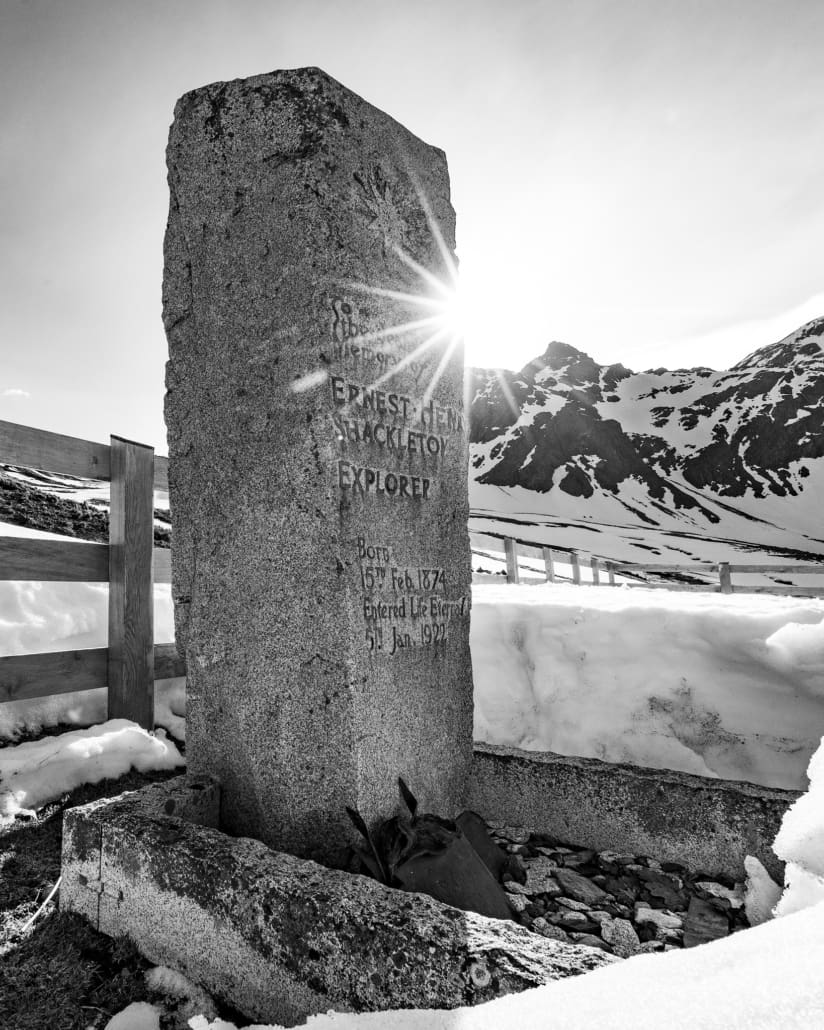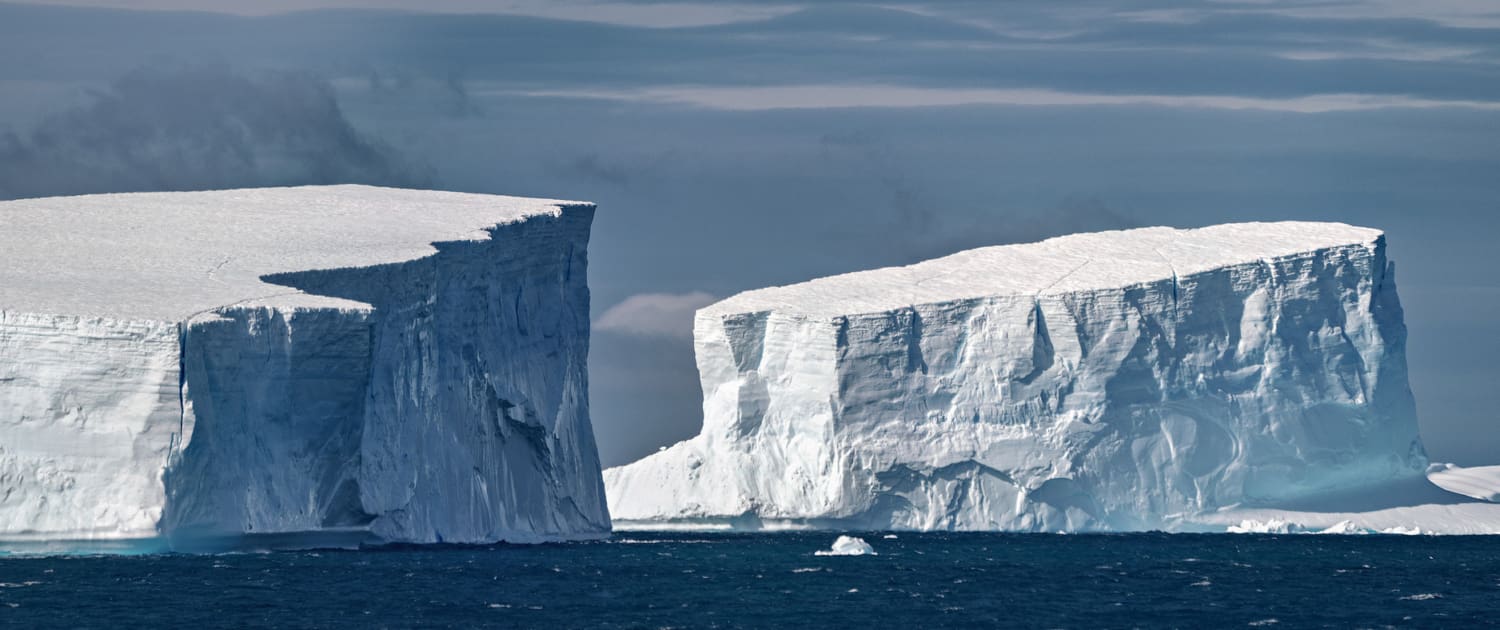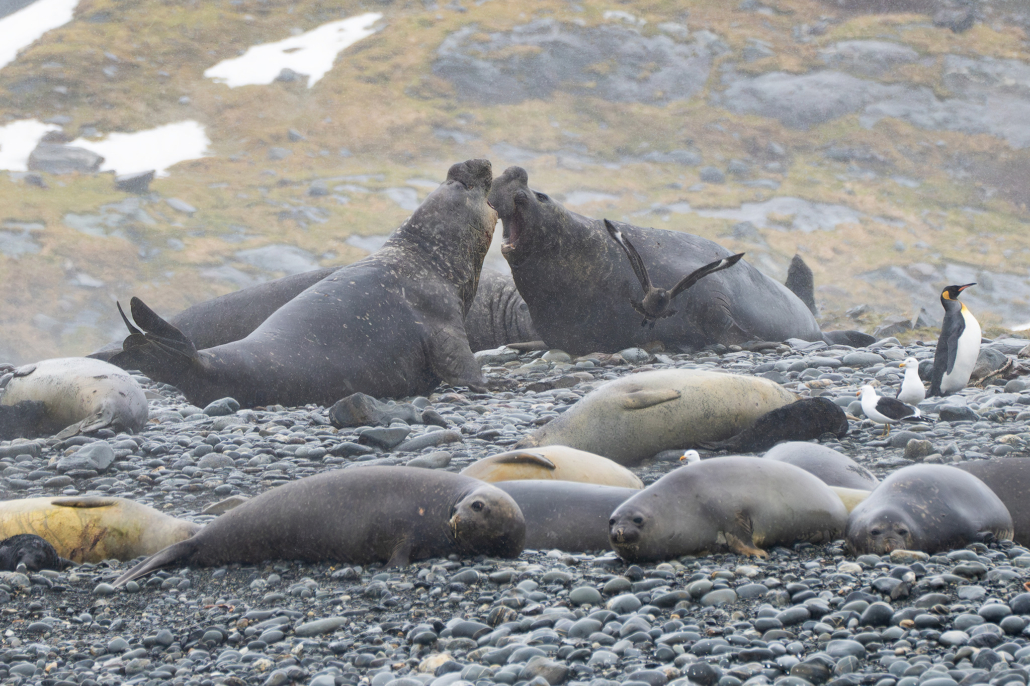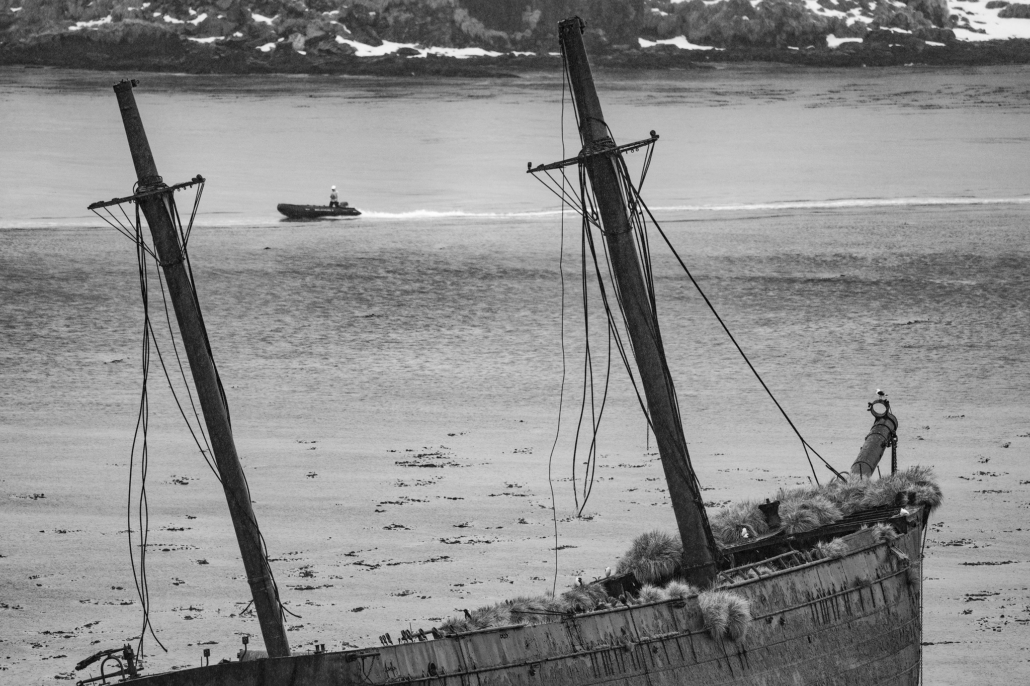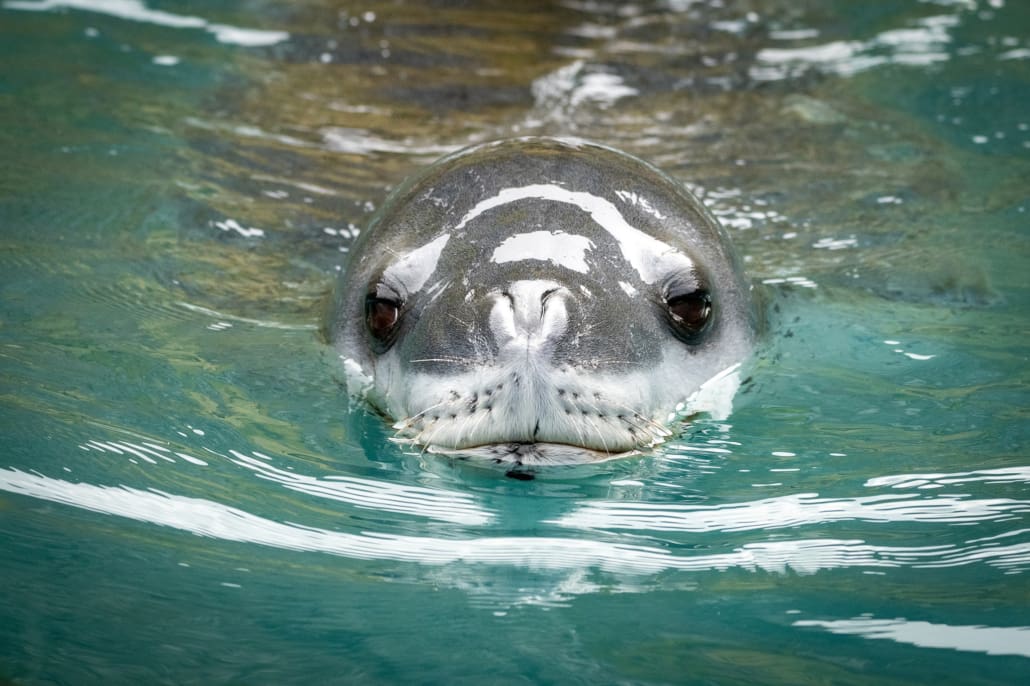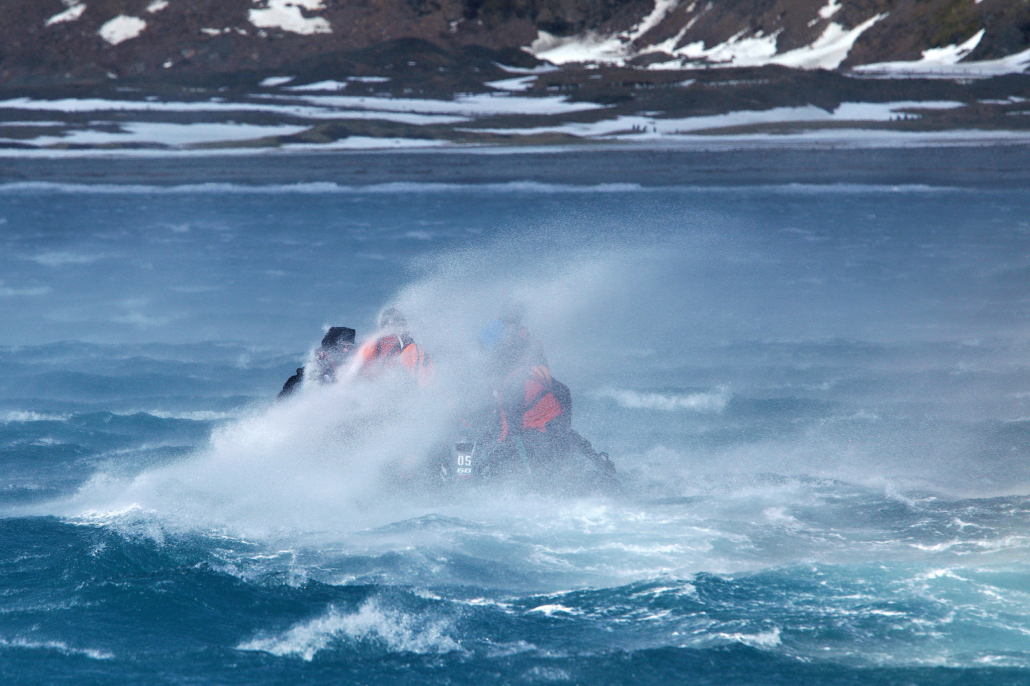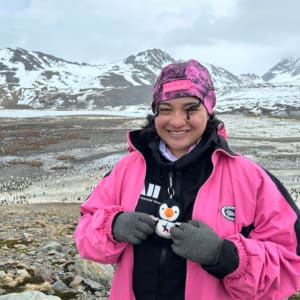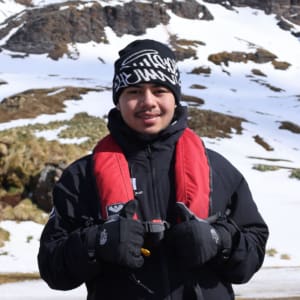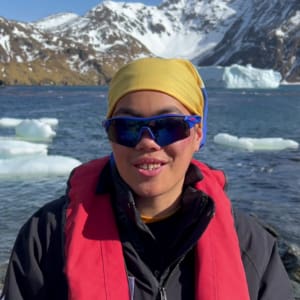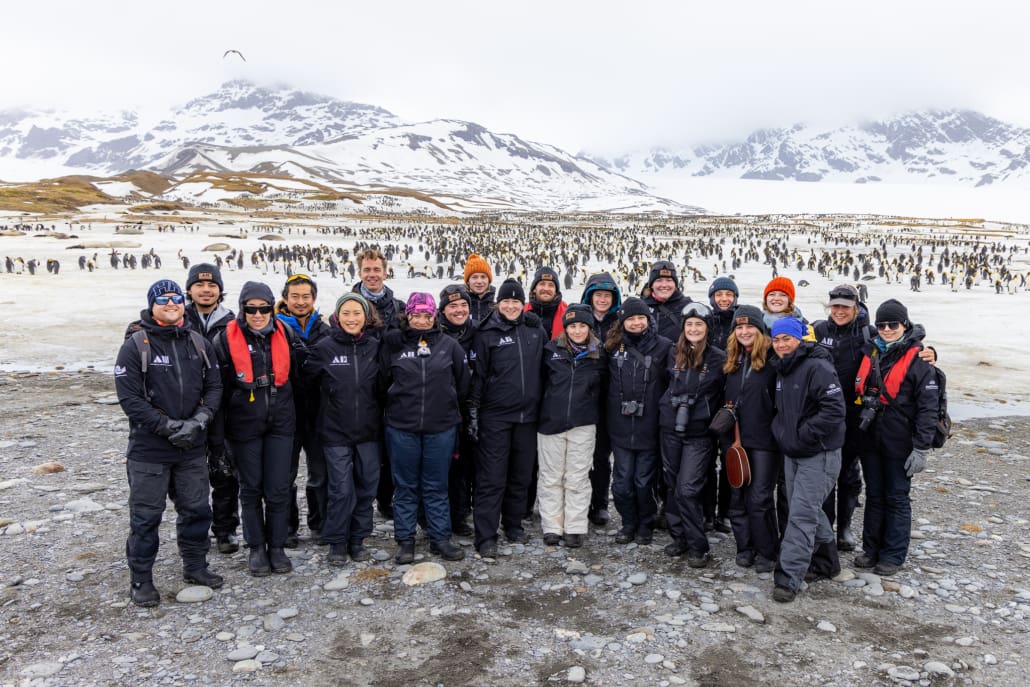Expedition Blog – Lawrence Rothwell, South Georgia 2023
The Best Thing I Have Ever Done
Lawrence Rothwell was one of 22 young New Zealanders who travelled with the Trust to South Georgia in October 2023 for our ninth Inspiring Explorers Expedition™ to honour the centenary year of Sir Ernest Shackleton’s final expedition, the Quest.
8 October 2023
“And finally, to the boss!” A small crowd echoed these words before raising a toast. We were standing at the grave of Sir Ernest Shackleton, one of the greatest explorers the world has ever known, and the reason for this expedition in the first place. I glanced around at the others. Half were supporters of the Trust. They had worked hard in life, and paid their way across the Scotia Sea to South Georgia Island. The other half of us (22 to be exact) were aged between 18 and 30 (a prerequisite for being selected). We had been chosen from hundreds of applicants and given an incredible opportunity to develop an ‘explorer mindset’, which consists of: curiosity, resilience, teamwork, innovation and leadership. Many of the Trust supporters, along with Inspiring Explorers™ Programme Partners MetService and Royal Society Te Apārangi had contributed financially to help make this expedition possible.
Years of planning, fundraising, applications, team building weekends, COVID-19 setbacks, and mountaineering training (for some) had led up to this moment that we were experiencing. We had climbed a metaphorical mountain to visit the grave of Sir Ernest Shackleton. It was hard not to feel like an imposter in someone else’s dream.
2 May 2023
I received a letter saying that I had not made the cut. The Trust expressed how difficult the selection process had been, and that they wished they could have taken everyone on their shortlist. They did, however, offer me a reserve place, in case one of the team had to pull out.
I had been through several rounds of the application process at this stage, and knew that I was down to the last 50 applicants. In all honesty, it was not a disappointment to receive the news. I never expected to get as far as I did, and at least now, after months of wondering, I knew the result.
Exactly one month later, I was in Dubai Airport, en route to Manchester. I felt the buzz of an incoming phone call in my pocket. To my surprise, it was Mike Barber, the Trust’s Inspiring Explorers™ Programme Manager. He told me that someone had pulled out of the expedition and that there was a place with my name on it if I wanted. I was so overcome with surprise for something that I had already accepted would not happen that out of pure panic I almost declined. I said yes, thanked Mike for his time, and hung up. Moments later, the entire Dubai International Airport also knew that I would be leaving for South Georgia on 28 September.
4 June 2023
Disaster. One week before our team building weekend with the 22 Inspiring Explorers™, I snapped two ligaments in my right knee, from which I have subsequently had a full MCL and ACL reconstruction surgery. Far worse than the physical pain of the injury was the thought that I may just have ruined my chances of going to South Georgia, that I would need to pull out of the trip,. Thankfully, I recovered in time.
The team building weekend itself was a lot of fun. While it was not enough time to get to know the other 21 Inspiring Explorers™, I vividly remember being startled by what these people had accomplished at such a young age, as well as the confidence and knowledge that everyone seemed to have. I was among the oldest of the 22 and I learned so much from each of them over the course of the expedition.
After the team building weekend, I set out on a fundraising mission. Though the Antarctic Heritage Trust supported over 90% of my costs, we were tasked with contributing the remainder. I approached several organisations, with the New Zealand Coastguard kindly agreeing to financially sponsor me and kit me out with Line7 cold weather clothing. Since joining as a volunteer with the Wellington Coastguard in 2015, I have been involved in just under 100 rescues. The Coastguard provides an invaluable service; one which I am extremely proud to be part of. It was not only their sponsorship that I am grateful for, but also the years of training that they have invested in me. I would like to take this opportunity to say a very sincere thank you.
2 October 2023
Having been delayed in Punta Arenas for two days due to the weather, we finally landed in the Falkland Islands and boarded the Magellan Explorer at 20:30. That night (and throughout the entire voyage) the Antarctica21 staff were exceptional hosts, and they made the expedition an unforgettable one. Following dinner, we were briefed about the ship and its safety procedures, as well as our expedition in general, before finally setting sail across the Scotia Sea.
Though I had grown up around boats from a young age (I was even christened on a British naval warship) this would be the first time in my life that I had been at sea without being able to see land. I adored the remoteness of it all, the feel of the pitch and roll as the ship carved its way through the swell, and the knowledge that out here you are not merely self-sufficient, but utterly responsible for your own survival.
5 October 2023
“Ladies and gentlemen, land ho!” The words rang over the ship’s tannoy system to announce the first sighting of the very Western tip of South Georgia Island. It was a scramble as everyone fumbled for their cameras and flooded to the bow to snatch a photo of the headland in front of us. After three days at sea, we had made it.
That afternoon we landed in Right Whale Bay. It was cold and drizzly, yet the most amazing thing we had experienced so far. As we disembarked from the Zodiacs onto the pebble beach, we followed a path that the guides had set for us about 30 minutes prior. As we would later discover with all landings in South Georgia, the path between the flags did its best to thread a needle between groups of wildlife, but we were always hyper aware that this was their environment and not ours. Penguins and elephant seals do not recognise human flags that have been planted to grant safe passage between their colonies. They will go wherever they want. We are the guests in their house, and it is us that must adapt to them.
That night we toasted our arrival in South Georgia. There was a collective outpour of relief from the passengers as we knew we had successfully navigated the formidable and unforgiving Scotia Sea. We were now in South Georgia and could begin exploring the island.
6 October 2023
Salisbury Plain. Home to an estimated 60,000 penguin pairs. Needless to say, this did not resemble the county of Wiltshire in England after which it was named. We hiked for miles through the snow and ice, through colonies of fur and elephant seals, until we reached the tundra covered plateau of the penguins’ home. A cacophony of squawking, the Salisbury Plain was a reminder that if we allow mother nature time and space to heal and breathe, then she will create beautiful things. Uncontaminated by plastics, rubbish, or fossil fuels; this was exactly what we were witnessing.
7 October 2023
Stromness Whaling Station. The whaling station here opened in 1907, became a ship repair yard in the 1931–2 season, and finally ceased operation altogether in 1961. We hiked for 4km inland to the waterfall that Shackleton and his men rappelled down at the finish line of one of the most epic survival stories ever told. I stood where Shackleton had once stood, in very different circumstances, and imagined the difficulty of rappelling down the icy cliff face, especially after the hell they had been through to get there in the first place. I was wearing merino thermals, polarised sunglasses, bespoke walking boots and a modern sailing jacket and trousers. I wondered what he might say if he could see our expedition today.
“We had pierced the veneer of outside things. We had suffered, starved, and triumphed, grovelled down yet grasped at glory, grown bigger in the bigness of the whole. We had seen God in his splendours, and heard the text that Nature renders. We had reached the naked soul of men.”
– Sir Ernest Shackleton, South
7 October 2023 happened to be my 31st birthday. The crew led a surprise Happy Birthday song at dinner, after which I was put on the spot to give a speech. It was the best birthday I have ever had, and I thank everyone from the bottom of my heart for making it so memorable.
8 October 2023
Godthul is a bay 1.6km long between Cape George and Long Point, on the east side of Barff Peninsula on the north coast of South Georgia Island. The name Godthul translates from Norwegian as “Good Hollow”. It is here we started the day before heading to Grytviken.
Four Inspiring Explorers™ had been chosen to take part in the Mount Worsley climb. This would be the first New Zealand attempt to summit the mountain, and in recognition of Kiwi explorer Frank Worsley, the mountain’s namesake. The climb would be led by experienced mountain guides Lydia Bradey and Dean Staples. The team had undergone specialist training with Lydia and Dean, and it is fair to say they had put in more work than the rest of us to prepare for the expedition.
Unfortunately, the Mount Worsley expedition did not go ahead. Days out from the climb, the team assessed the unfavourable weather and knew that it would be unlikely. Nonetheless, they prepared for the climb right up until the last minute when, at 06:00 on departure day, the call was made to cancel the climb. It was an emotional time for the team. They had to put their explorer mindset into practice, demonstrating a high level of resilience. Though they always knew the climb would be weather dependent, it was a tough pill to swallow to be told that what you have prepared and trained hard for over the last six months will not eventuate. What they were able to do, however, was summit Mount Hodges. This climb was confirmed after a last-minute change to the permit was obtained, and while it would not compare to an ascent of Mount Worsley, it allowed the team the opportunity to put into practice some of what they had trained for.
While they made their way up the mountain, we explored Grytviken, sent postcards to loved ones from the Post Office (these would arrive over a month later in New Zealand), and made our way to the last resting place of the great man, Sir Ernest Shackleton (the boss). More than a century after his death, his legacy continues to inspire explorers worldwide, and is the entire reason for the Antarctic Heritage Trust’s expedition to South Georgia. I remember thinking it quite appropriate that in order to visit the grave of one of the greatest explorers the world has ever seen, you must yourself first cross one of the world’s most treacherous oceans.
9 October 2023
Drygalski Fjord. Situated at the southern end of South Georgia, the fjord is 14km long with mountains and glaciers rising to 2,000 metres creating spectacular landscapes. Drygalski Fjord was the turning point for our expedition, and although I was eager to witness its staggering beauty, reaching the turning point of our adventure meant that every move we made afterwards would be in the direction of home. And I was not ready to go home.
The fjord is one of the most incredible things I have seen in my life. As the Magellan Explorer navigated its way through tabular icebergs as big as buildings, I knew I was not the only one who felt exposed to the rawness of nature. The ship was making way through a maze of floating ice, any of which could split at any moment, sending colossal waves towards us. If mother nature wished to clench her fist and trap us, she could have done so, easily. We were totally at her mercy, and we allowed ourselves to feel unashamedly vulnerable in front of her. The problems I encountered on a daily basis back in Wellington, New Zealand suddenly seemed inconsequential in the presence of this incredible landscape.
10 October
A 3km sweep of black sand beach crossed by several rivers, St Andrews Bay is home to the largest congregation of elephant seals and the largest king penguin rookery in South Georgia. As many as 6,000 female elephant seals come ashore here in the spring to give birth to their pups, whilst the king penguin colony numbers an estimated 200,000.
Today we also visited Ocean Harbour, which lies about 6 km south of Godthul and roughly halfway between St Andrews Bay and the entrance to Cumberland Bay. The whaling station stood at the head of the harbour until 1920 when most of it was removed to Stromness. Only a few visible relics remain, among them: the wreck of the Bayard, a three masted iron hulled sailing ship built in Liverpool in 1864, and a handful of graves. These serve as an eerie reminder that if you run into trouble in this part of the world, help is not just over the nearest hill. You are on your own.
11 October
Elsehul is a small natural harbour at the very north-western end of South Georgia, where the island’s wildlife is at its densest. We did not make land here, but instead traced the shoreline in Zodiacs. It was here that a playful leopard seal approached the boats to say hello. The ship’s photographer captured an excellent close-up photo of the seal which perfectly captures its serpentine eyes, and sleek skin.
Elsehul was our last anchorage before we headed out into the Scotia Sea and back to the Falkland Islands. It was a sombre moment as we watched the outline of the most remote and inhospitable islands in the world disappear out of sight behind us, knowing that we would almost certainly never come back here in our lifetime.
I had invested the last six months of my life preparing for South Georgia, and now it was over. We were heading home.
12–14 October 2023
The next few days at sea were the roughest I have ever encountered in my life. At one point, we encountered 10 metre swells which threw the boat around like a rag-doll. As the Magellan Explorer pitched and rolled through the swell, people constantly lost their balance and fell over in the hallways, were thrown out of their bunks at night, and at meal times, plates, glasses and cutlery were cast onto the floor as we carefully chose the perfect moment between the peaks and troughs of the waves to bring food and water to our mouths. Needless to say, seasickness was rife throughout the ship. The relentless sea state continued like this for the best part of three days, with the only respite coming when we entered the shelter of the Falkland Islands.
The remainder of the expedition felt sombre. Once we had disembarked from the ship, we retraced our steps back to Auckland airport without stopping:
- Falkland Islands to Punta Arenas.
- Punta Arenas to Santiago.
- Santiago to Auckland.
- Auckland to Wellington (home).
As is common when going through a life changing experience, there were a lot of emotional farewells in Auckland airport (21 to be precise). It would be hard to return to and be motivated by our ordinary lives again, and to accurately articulate the majesty of what we had witnessed to our colleagues and friends.
Going to South Georgia was the best thing I have ever done, without exception. There are so many reasons for this, but the largest contributing factor was the people around me. While all of the 22 Inspiring Explorers™ taught me something, I want to draw your attention to the three youngest Inspiring Explorers™ in our group (everyone’s bios can be found here): Destiny Martin, Rykien Amiatu, and Porohu Hagai Noa.
I had waited until I was 31 years old to experience the best thing in my life, whereas these three all experienced it as teenagers. Each remarkable in their own way, these three are immensely impressive individuals, and I will follow their journeys with great interest.
24 November 2023
Mike Barber from the Trust called me to check in on how I’d been doing since returning to life as normal, post-expedition. Mike is friendly, helpful, funny, competent, calm under pressure, and incredibly humble despite the extraordinary life he has led; but what I have always respected above any of these traits is his kindness. We had a great catch up, and I hope we will have many more over the years, especially as I plan to be involved with the Antarctic Heritage Trust in future. I owe a lot to Mike Barber and the team at Antarctic Heritage Trust.
Finally, to the Antarctic Heritage Trust itself, and it’s donors that made this possible, thank you. Thank you for the experience of a lifetime. Thank you for taking me to a part of the world that only a lucky few will venture to. Thank you for introducing me to the other 21 Inspiring Explorers™ who will remain my lifelong friends, as well as the generous supporters and partners who joined us on the expedition. Thank you for enriching the lives of the next generation on a daily basis. Thank you for working to conserve Antarctica’s cultural heritage and championing the preservation of Antarctica’s environment and ecosystem. Thank you for teaching us about why we should care for the region. Thank you for the laughter and tears along the way. Thank you for investing in me to go on this expedition. Thank you for being there throughout the best thing I have ever done.
You have changed my life.

